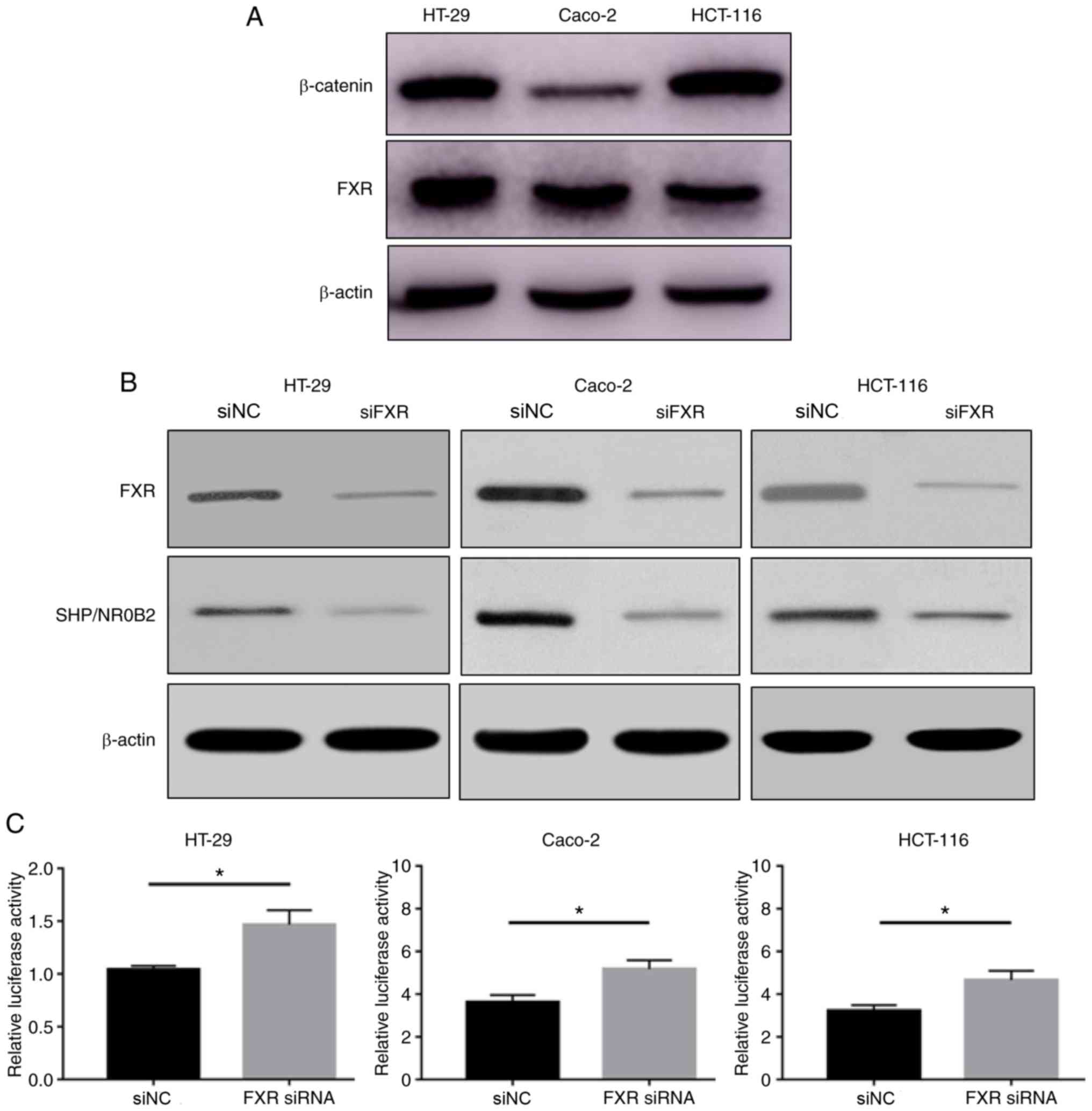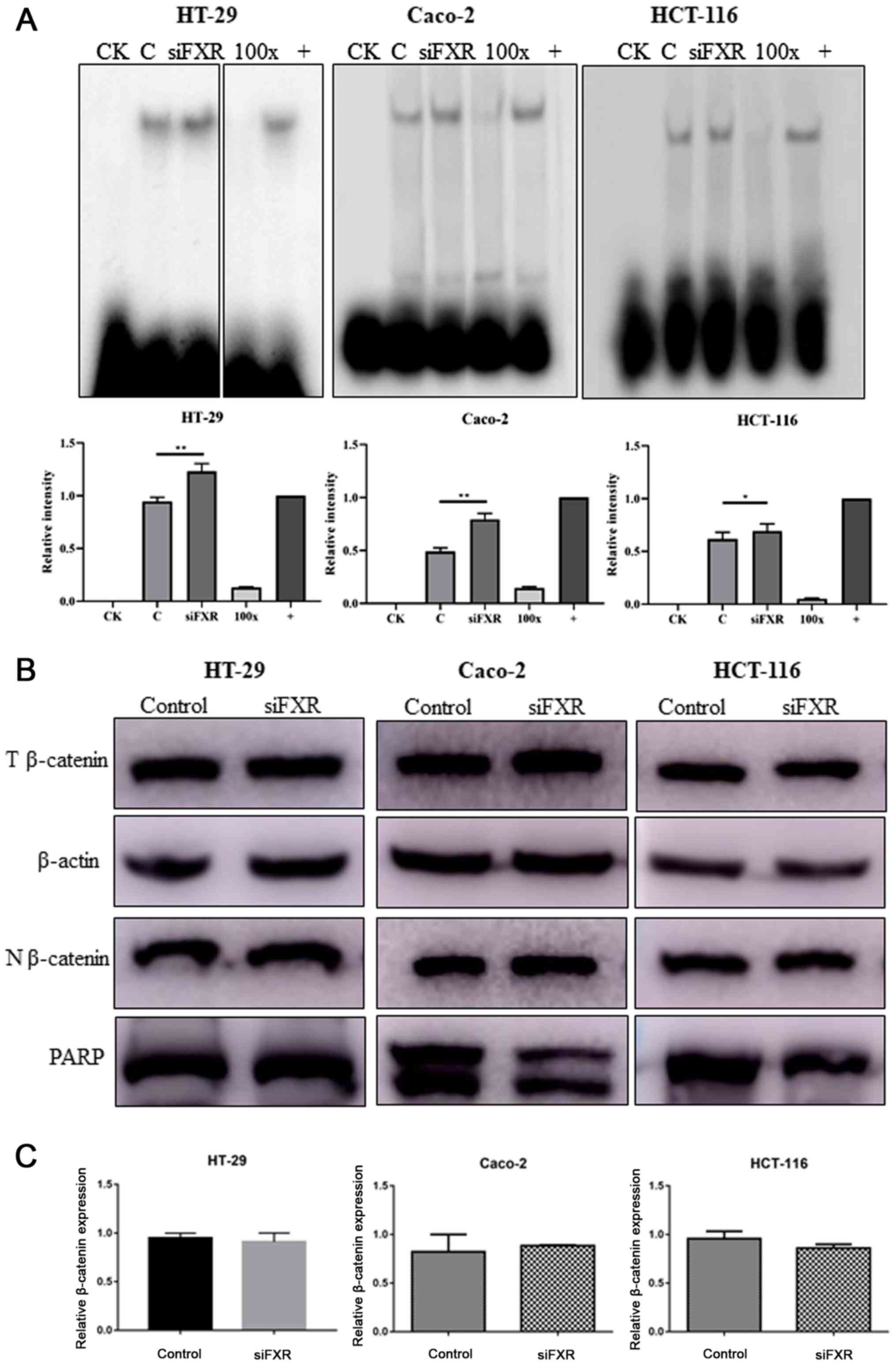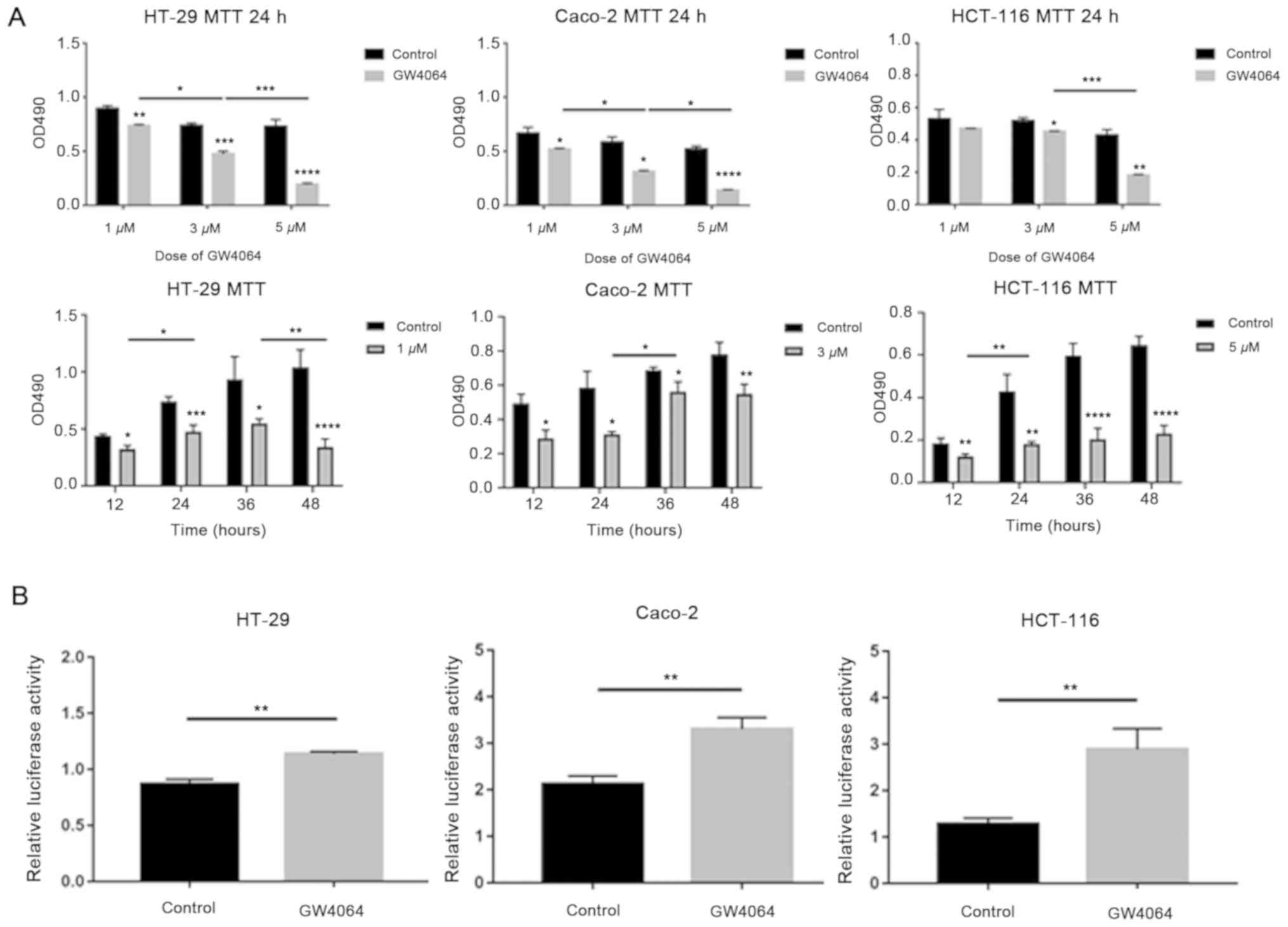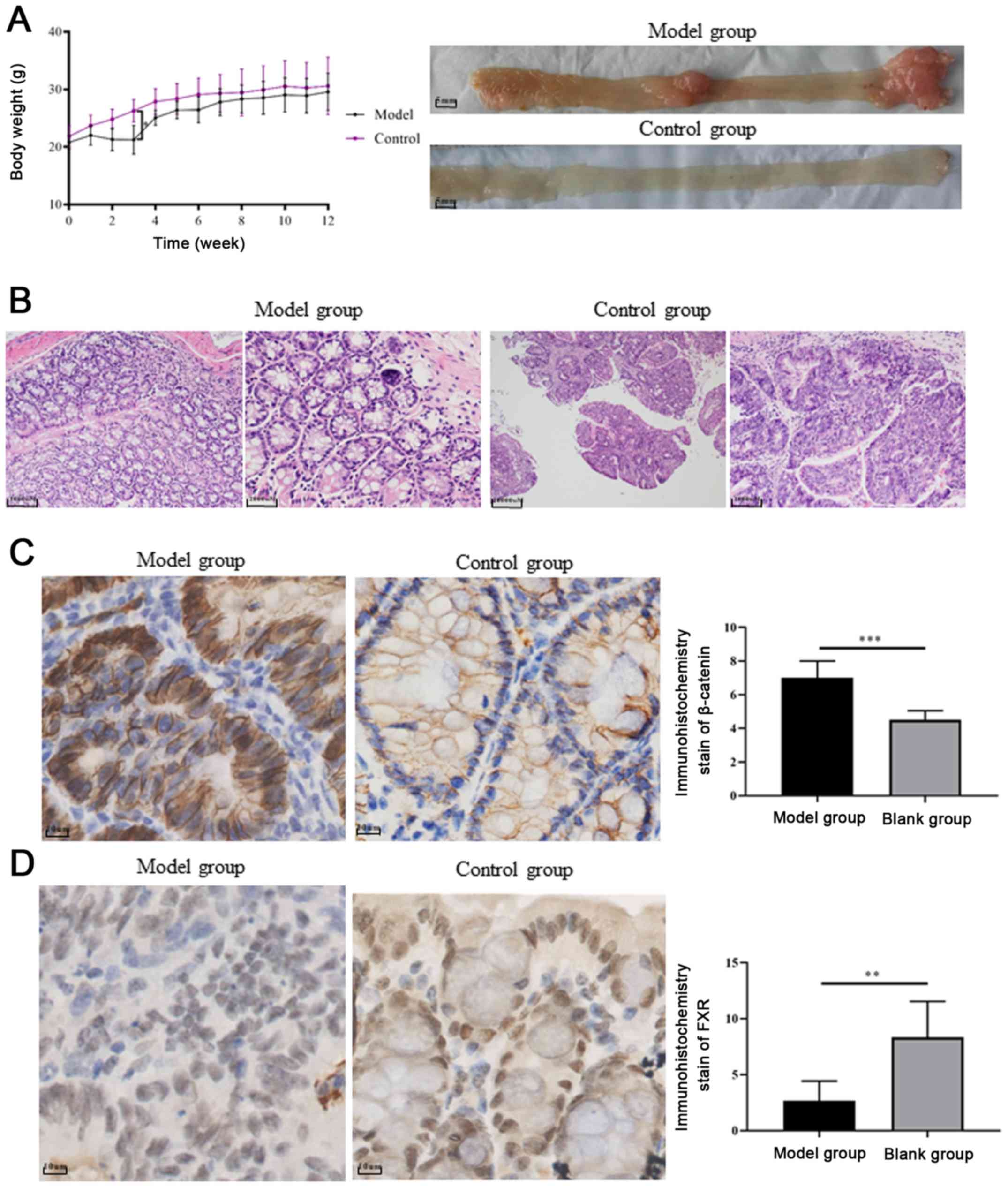|
1
|
Reddy BS: Diet and excretion of bile
acids. Cancer Res. 41:3766–3768. 1981.PubMed/NCBI
|
|
2
|
Lagergren J, Ye W and Ekbom A: Intestinal
cancer after cholecystectomy: Is bile involved in carcinogenesis?
Gastroenterology. 121:542–547. 2001. View Article : Google Scholar : PubMed/NCBI
|
|
3
|
Peterlik M: Role of bile acid secretion in
human colorectal cancer. Wien Med Wochenschr. 158:539–541. 2008.
View Article : Google Scholar : PubMed/NCBI
|
|
4
|
Pearson JR, Gill CI and Rowland IR: Diet,
fecal water, and colon cancer-development of a biomarker. Nutr Rev.
67:509–526. 2009. View Article : Google Scholar : PubMed/NCBI
|
|
5
|
Kundu S, Kumar S and Bajaj A: Cross-talk
between bile acids and gastrointestinal tract for progression and
development of cancer and its therapeutic implications. IUBMB Life.
67:514–523. 2015. View
Article : Google Scholar : PubMed/NCBI
|
|
6
|
Degirolamo C, Modica S, Palasciano G and
Moschetta A: Bile acids and colon cancer: Solving the puzzle with
nuclear receptors. Trends Mol Med. 17:564–572. 2011. View Article : Google Scholar : PubMed/NCBI
|
|
7
|
Modica S, Gofflot F, Murzilli S, D'Orazio
A, Salvatore L, Pellegrini F, Nicolucci A, Tognoni G, Copetti M,
Valanzano R, et al: The intestinal nuclear receptor signature with
epithelial localization patterns and expression modulation in
tumors. Gastroenterology. 138:636–648, 648.e1-12. 2010. View Article : Google Scholar : PubMed/NCBI
|
|
8
|
Bailey AM, Zhan L, Maru D, Shureiqi I,
Pickering CR, Kiriakova G, Izzo J, He N, Wei C, Baladandayuthapani
V, et al: FXR silencing in human colon cancer by DNA methylation
and KRAS signaling. Am J Physiol Gastrointest Liver Physiol.
306:G48–G58. 2014. View Article : Google Scholar : PubMed/NCBI
|
|
9
|
Lax S, Schauer G, Prein K, Kapitan M,
Silbert D, Berghold A, Berger A and Trauner M: Expression of the
nuclear bile acid receptor/farnesoid X receptor is reduced in human
colon carcinoma compared to nonneoplastic mucosa independent from
site and may be associated with adverse prognosis. Int J Cancer.
130:2232–2239. 2012. View Article : Google Scholar : PubMed/NCBI
|
|
10
|
Frankenberg T, Rao A, Chen F, Haywood J,
Shneider BL and Dawson PA: Regulation of the mouse organic solute
transporter alpha-beta, Ostalpha-Ostbeta, by bile acids. Am J
Physiol Gastrointest Liver Physiol. 290:G912–G922. 2006. View Article : Google Scholar : PubMed/NCBI
|
|
11
|
De Gottardi A, Touri F, Maurer CA, Perez
A, Maurhofer O, Ventre G, Bentzen CL, Niesor EJ and Dufour JF: The
bile acid nuclear receptor FXR and the bile acid binding protein
IBABP are differently expressed in colon cancer. Dig Dis Sci.
49:982–989. 2004. View Article : Google Scholar : PubMed/NCBI
|
|
12
|
Gadaleta RM, van Erpecum KJ, Oldenburg B,
Willemsen EC, Renooij W, Murzilli S, Klomp LW, Siersema PD,
Schipper ME, Danese S, et al: Farnesoid X receptor activation
inhibits inflammation and preserves the intestinal barrier in
inflammatory bowel disease. Gut. 60:463–472. 2011. View Article : Google Scholar : PubMed/NCBI
|
|
13
|
Modica S, Murzilli S, Salvatore L, Schmidt
DR and Moschetta A: Nuclear bile acid receptor FXR protects against
intestinal tumorigenesis. Cancer Res. 68:9589–9594. 2008.
View Article : Google Scholar : PubMed/NCBI
|
|
14
|
Gadaleta RM, Garcia-Irigoyen O and
Moschetta A: Bile acids and colon cancer: Is FXR the solution of
the conundrum? Mol Aspects Med. 56:66–74. 2017. View Article : Google Scholar : PubMed/NCBI
|
|
15
|
Korinek V, Barker N, Morin PJ, van Wichen
D, de Weger R, Kinzler KW, Vogelstein B and Clevers H: Constitutive
transcriptional activation by a beta-catenin-Tcf complex in
APC-/-colon carcinoma. Science. 275:1784–1787. 1997. View Article : Google Scholar : PubMed/NCBI
|
|
16
|
Mizushima T, Nakagawa H, Kamberov YG,
Wilder EL, Klein PS and Rustgi AK: Wnt-1 but not epidermal growth
factor induces beta-catenin/T-cell factor-dependent transcription
in esophageal cancer cells. Cancer Res. 62:277–282. 2002.PubMed/NCBI
|
|
17
|
Ni D, Liu J, Hu Y, Liu Y, Gu Y, Zhou Q and
Xie Y: A1CF-Axin2 signal axis regulates apoptosis and migration in
Wilms tumor-derived cells through Wnt/β-catenin pathway. Vitro Cell
Dev Biol Anim. 55:252–259. 2019. View Article : Google Scholar
|
|
18
|
Xin Y, He L, Luan Z, Lv H, Yang H, Zhou Y,
Zhao X, Zhou W, Yu S, Tan B, et al: E-cadherin mediates the
preventive effect of Vitamin D3 in Colitis-associated
Carcinogenesis. Inflamm Bowel Dis. 23:1535–1543. 2017. View Article : Google Scholar : PubMed/NCBI
|
|
19
|
Livak KJ and Schmittgen TD: Analysis of
relative gene expression data using real-time quantitative PCR and
the 2(-Delta Delta C(T)) method. Methods. 25:402–408. 2001.
View Article : Google Scholar : PubMed/NCBI
|
|
20
|
Liu X, Zhang X, Ji L, Gu J, Zhou M and
Chen S: Farnesoid X receptor associates with β-catenin and inhibits
its activity in hepatocellular carcinoma. Oncotarget. 6:4226–4238.
2015.PubMed/NCBI
|
|
21
|
Peng Z, Raufman JP and Xie G: Src-mediated
cross-talk between farnesoid X and epidermal growth factor
receptors inhibits human intestinal cell proliferation and
tumorigenesis. PLoS One. 7:e484612012. View Article : Google Scholar : PubMed/NCBI
|
|
22
|
Tanaka T, Kohno H, Suzuki R, Yamada Y,
Sugie S and Mori H: A novel inflammation-related mouse colon
carcinogenesis model induced by azoxymethane and dextran sodium
sulfate. Cancer Sci. 94:965–973. 2003. View Article : Google Scholar : PubMed/NCBI
|
|
23
|
Cavard C, Colnot S, Audard V, Benhamouche
S, Finzi L, Torre C, Grimber G, Godard C, Terris B and Perret C:
Wnt/beta-catenin pathway in hepatocellular carcinoma pathogenesis
and liver physiology. Future Oncol. 4:647–660. 2008. View Article : Google Scholar : PubMed/NCBI
|
|
24
|
Cancer Genome Atlas Network, .
Comprehensive molecular characterization of human colon and rectal
cancer. Nature. 487:330–337. 2012. View Article : Google Scholar : PubMed/NCBI
|
|
25
|
Fu T, Coulter S, Yoshihara E, Oh TG, Fang
S, Cayabyab F, Zhu Q, Zhang T, Leblanc M, Liu S, et al: FXR
regulates intestinal cancer stem cell proliferation. Cell.
176:1098–1112.e18. 2019. View Article : Google Scholar : PubMed/NCBI
|
|
26
|
Thompson MD, Moghe A, Cornuet P, Marino R,
Tian J, Wang P, Ma X, Abrams M, Locker J, Monga SP and Nejak-Bowen
K: β-Catenin regulation of farnesoid X receptor signaling and bile
acid metabolism during murine cholestasis. Hepatology. 67:955–971.
2018. View Article : Google Scholar : PubMed/NCBI
|
|
27
|
Zhang R, Nakao T, Luo J, Xue Y, Cornuet P,
Oertel M, Kosar K, Singh S and Nejak-Bowen K: Activation of
WNT/Beta-catenin signaling and regulation of the Farnesoid X
Receptor/Beta-catenin complex after murine bile duct ligation.
Hepatol Communications. 3:1642–1655. 2019. View Article : Google Scholar
|
|
28
|
Maran RR, Thomas A, Roth M, Sheng Z,
Esterly N, Pinson D, Gao X, Zhang Y, Ganapathy V, Gonzalez FJ and
Guo GL: Farnesoid X receptor deficiency in mice leads to increased
intestinal epithelial cell proliferation and tumor development. J
Pharmacol Exp Ther. 328:469–477. 2009. View Article : Google Scholar : PubMed/NCBI
|
|
29
|
Sawa M, Masuda M and Yamada T: Targeting
the Wnt signaling pathway in colorectal cancer. Expert Opin Ther
Targets. 20:419–429. 2016. View Article : Google Scholar : PubMed/NCBI
|
|
30
|
Mulholland DJ, Dedhar S, Coetzee GA and
Nelson CC: Interaction of nuclear receptors with the
Wnt/β-catenin/Tcf signaling axis: Wnt you like to know? Endocr Rev.
26:898–915. 2006. View Article : Google Scholar
|
|
31
|
Xiao JH, Ghosn C, Hinchman C, Forbes C,
Wang J, Snider N, Cordrey A, Zhao Y and Chandraratna RA:
Adenomatous polyposis coli (APC)-independent regulation of
beta-catenin degradation via a retinoid X receptor-mediated
pathway. J Biol Chem. 278:29954–29962. 2003. View Article : Google Scholar : PubMed/NCBI
|
|
32
|
Han A, Tong C, Hu D, Bi X and Yang W: A
direct protein-protein interaction is involved in the suppression
of beta-catenin transcription by retinoid X receptor alpha in
colorectal cancer cells. Cancer Biol Ther. 7:454–459. 2008.
View Article : Google Scholar : PubMed/NCBI
|
|
33
|
Palmer HG, González-Sancho JM, Espada J,
Berciano MT, Puig I, Baulida J, Quintanilla M, Cano A, de Herreros
AG, Lafarga M and Muñoz A: Vitamin D(3) promotes the
differentiation of colon carcinoma cells by the induction of
E-cadherin and the inhibition of beta-catenin signaling. J Cell
Biol. 154:369–387. 2001. View Article : Google Scholar : PubMed/NCBI
|


















